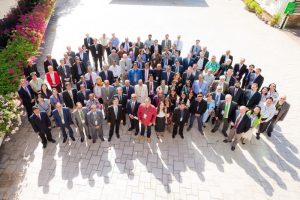About Us > Overview
 The Asia-Pacific Association of Agricultural Research Institutions (APAARI) was established in 1990 by the Food and Agriculture Organization of the United Nations (FAO) and Governments of China, Fiji, India, Iran, Malaysia, New Zealand, Pakistan, Papua New Guinea, Philippines, Republic of Korea, Sri Lanka, Thailand and Western Samoa.
The Asia-Pacific Association of Agricultural Research Institutions (APAARI) was established in 1990 by the Food and Agriculture Organization of the United Nations (FAO) and Governments of China, Fiji, India, Iran, Malaysia, New Zealand, Pakistan, Papua New Guinea, Philippines, Republic of Korea, Sri Lanka, Thailand and Western Samoa.
It is a membership-based, apolitical, multi-stakeholder, and inter-governmental regional organization. As an important intermediary in the region, it is bridging national, regional and global stakeholders to bring about collective change in agri-food systems of Asia-Pacific.
APAARI’s wide network of members and partners comprises of national agricultural research institutes (NARIs) and national agricultural research organizations (NAROs), international agricultural research centres, higher education institutions, civil society (farmers’ organizations – FOs and non-governmental organizations – NGOs), international development organizations and the private sector. The close links and collaboration with these stakeholders are instrumental in strengthening agri-food research and innovation systems towards more sustainable development in Asia-Pacific region.
APAARI VISION 2030
Following the call of the APAARI General Assembly to revisit the APAARI Vision 2025 in 2014 and to reprioritize its activities to meet the needs of a changing development context, APAARI developed its Vision 2030 for strengthened research and innovations for sustainable agricultural development. The APAARI Vision 2030 aligns to the United Nations (UN) Sustainable Development Goals (SDGs) and suggests a strategic direction for the future development of agri-food research and innovation systems in the region. The Vision also influenced the development of the APAARI Strategic Plan 2017-2022, which is the main strategy instrument to guide the programmes, projects and activities of the Association.
Vision: “Strengthened research and innovations for sustainable agricultural development in Asia and the Pacific”.
Mission: Promoting, coordinating and strengthening agriculture and agri-food research and innovation systems through partnerships and collaboration, capacity development and advocacy for sustainable agricultural development in Asia and the Pacific.
Goal: The Asia-Pacific region benefits from and values APAARI’s leadership and contribution to developing agriculture and agri-food research and innovation systems.
APAARI’s core values continue to inspire shareholders and stakeholders and make the Association their trusted and dependable ally for sustainable agricultural development in the region. These core values are as below.
Visionary approach: Foreseeing the future and working in the frontier areas through collaboration and partnership to realize the full potential of scientific research and innovation for sustainable development, advancing ideas and innovations, and encouraging creativity and initiatives.
Devoted to merit and excellence: Functioning as a capable and motivated organization providing an enabling environment for attaining excellence by investing available resources optimally to leverage the full potential of research and innovation for development.
Learning and growing: Continually enhancing knowledge and skills to identify opportunities and capitalize on them for the growth and development of community, system, the nation and the weaker and smaller NARIs and NAROs.
Inclusiveness with equity in participation: Strongly believing that only involving and including the contributions of all potential players and fully harnessing opportunities in partnerships and collaboration both nationally and internationally, with greater equity in participation and sharing of benefits, can meet the growing aspirations of all its stakeholders.
Accountability with highest integrity: Operating with the highest performance standards and integrity, openness and transparency and maintaining high quality in its administration, management and oversight.
